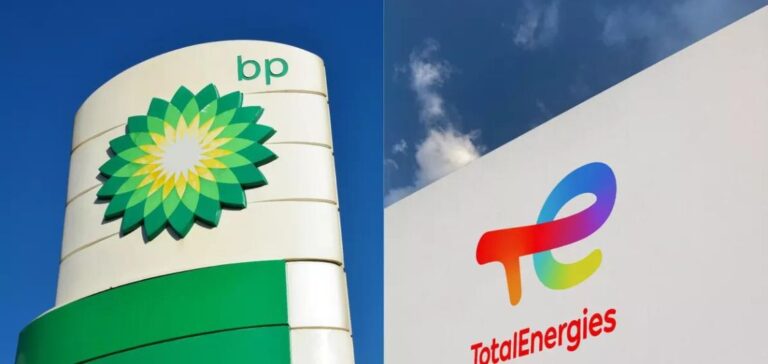British giants BP and French TotalEnergies have won an unprecedented bidding process in Germany for the construction of offshore wind farms, agreeing to pay 12.6 billion euros, the German regulator announced on Wednesday.
BP and TotalEnergies win German offshore wind bids
This confirms “the attractiveness of offshore wind investments in Germany”, as this was the largest auction of its kind, enthused Klaus Müller, Chairman of the Federal Grid Agency, in a statement. The tender covers three sites in the North Sea and another in the Baltic Sea, with commissioning scheduled for 2030, and a total capacity of 7 gigawatts (GW) at a time when Germany, committed to an ambitious renewable energy development plan, is aiming for 30 GW of offshore wind capacity by 2030.
Europe’s leading economy currently has 8 GW of installed offshore wind power. In this respect, these concessions represent “an important step towards achieving the objective”, according to the German regulator. BP and TotalEnergies, who will pay 12.6 billion euros, won the bidding among eight bidders.
“Competition for offshore wind power is stronger than ever,” adds Klaus Müller.”
This attractiveness is illustrated by the fact that several “zero cent bids” were received for the four sites, meaning that prospective operators were prepared to take the risk of building the facilities without a government guarantee of a sale price for their output, and therefore even if they could only make zero cents from the electricity generated by the wind farm. – 3 million households – To decide between them, a second round of auctions was organized, “uncapped and awarded on the basis of price alone”, according to the WindEurope association, which criticized this procedure.
The sums disbursed “mean that the costs will have to be passed on to consumers and to the wind energy supply chain, which is already in difficulty”, lamented the association, which represents the wind energy industry in Brussels.
Germany advances towards its renewable energy targets thanks to offshore wind concessions
On the contrary, the German grid agency welcomed the windfall, indicating that 90% of the revenue will be used to reduce electricity costs, with the remainder going towards marine conservation and sustainable fishing measures. TotalEnergies, which has been awarded two marine concessions, one in the North Sea and the other in the Baltic Sea, said in a press release issued in Paris that “these concessions will run for 25 years, extendable to 35 years”.
“These two wind farms will supply a volume of electricity equivalent to the consumption of more than 3 million households”, assures the French group, which “will pay the German federal government 582 million euros allocated to the conservation of the marine environment and the promotion of environmentally-friendly fishing”.
“An annual contribution to the transmission system operators in charge of connecting the projects will be paid for 20 years from the commissioning of the sites,” he adds, stressing that “the production generated by these sites will be marketed by TotalEnergies”.
Chancellor Olaf Scholz’s German government has pledged to generate 80% of electricity from renewable energy sources by 2030, while phasing out coal after renouncing nuclear power, implying an ambitious timetable for developing wind and solar power.






















